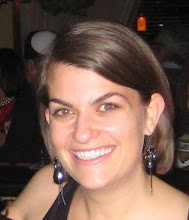I have thought about it over and over again and I cannot seem to remember for the life of me where I spent New Years Eve 2006. It must not have been that memorable... Yet as I look over the year as a whole so much took place. I could not have imagined a year ago that I would be where I am now. Geographically, theologically, socially, etc... In entering 2007 I can only hope that I again will not be able to fully predict where I will be January 2008. For if I had known all I know now this time last year I would not have grown half as much.
I know it has been a while since I last posted something substantial. Life has been busy, in good ways, and I kinda hoped that by posting colorful/animated links it would keep you entertained.
In our Gemara shiur today we were discussing the concept of Tikun Olam. A phrase that is commonly used today in the context of Social Justice/Activism. The literal translation is 'Repairing the World'. A beautiful idea. In our text however we were trying to grapple with what context it was being used in. There is high doubt that the scholarly Rabbi's meant it in the same way we use it today. It is used in our Mishna in reference to land distribution after one party has damaged the property of another. So what were these Rabbi's trying to fix and in what world were they refering to? As we continued to learn we talked about where in the Torah we learn about payment for damaged property and how it is understood by different scholars. Like most conversations in Gemara there was a dispute. This dispute is based on interpretation of the text. According to Rabbi Yismael (the scholar the Mishna appears to hold by) the text in the Torah needs amendment on who's fields are assesed to base the repaymet-the damaged party or the one who damaged. Therefore the Tikun (fixing) is placing Rabbinic ruling above the ruling of the Torah text. This begs from me two categories of questions:
1. What was going on that the Rabbi's needed to discuss this repairing? What wasn't working in society? All society? The court system? Social circumstances? Problems within the Rabbinic community?
2. What other statements found in the Torah may be able to be overturned by this idea of Tikun Olam? Who/ What determines them?
This comes back to the question I struggle with--why has the conversation closed? Why are we so afraid of re-opening the Machlokets (arguments/discussions full of conflicting opinions) and the possibility of change. I think my teacher stated correctly today that we are much more fearful today of these arguments than ever before, why do we not trust ourselves to approach them in the same passion and humilty that was done years ago? Why is what is in the past so untouchable by traditional Judaism today?
Okay, so what have I been doing all this time that has kept me so busy? Well, Taglit-birthright Israel buses are on the ground and running. Most of my work with them is complete since all the logistical stuff was taken care of months ago. However I am still the point person between the scholars and the groups and so the quiet won't return until after Jan 20.
A couple of weeks ago I confronted the Fellows about my dissapointment and frustration with the program. A program that is promoted as a leadership program in reality appeared to be students who wanted a free seccond year at Pardes and at the end of the day were not all that interested in taking on roles in either our program or the Pardes community. As a result I sat down with the head of our program and then typed up a 3 page proposal on how I think they should redesign/enhance the program for next year. In short what it proposes is to place the Fellows program on par with the Pardes Educators program. The Educators program (which is known for turning out some of the best young Jewish educators in North America) is challenging, selective in candidates, and prepares students to be good Jewish professionals. So too the Fellows program should give participants opportunities to meet with various Jewish leaders and organizations, teach them about different models of leadership, and engage them more in leadership opportunities at Pardes (If you want to know more or more specifics I am happy to share but don't want to type them all out). It was recieved very well by the staff and we are looking for ways to start implementing it now. It was submitted to current Fellows and students for feedback (I requested to stay anonymous in the process) and it looks like its got real potential. I am proud of it. It not only was a affirmation of my own frustrations but it is exciting as well to be part of a process that will hopefully actualize the real potential of the program for years to come.
I have had a lot of visitors in the last few weeks which has been really nice. As mentioned in an earlier post, it's hard to go for long periods of time without friendly and familiar faces.
I have lots more to write about this new year but again I am out of time.
Enjoy the first Shabbat of 2007!
Subscribe to:
Post Comments (Atom)

No comments:
Post a Comment